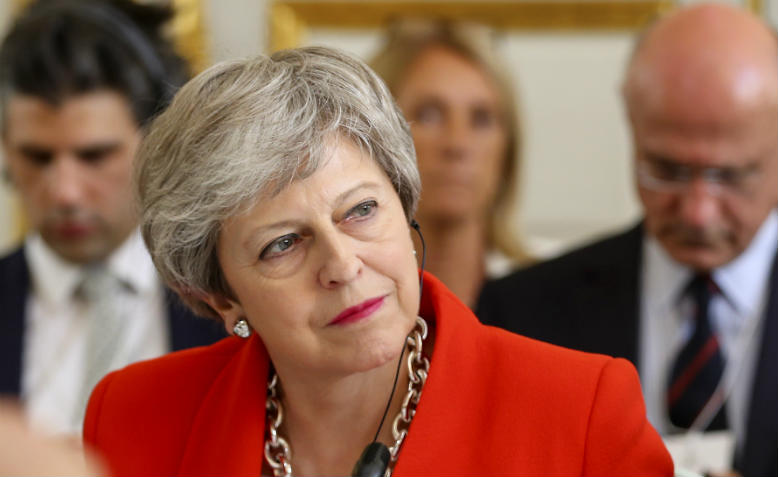 Theresa May. Photo: Flickr/Number10
Theresa May. Photo: Flickr/Number10
Following Theresa May’s resignation, Chris Nineham looks at her record as Prime Minister and what the left should do next
It is an undeniable fact that Theresa May lacks leadership abilities. She is a poor communicator. Far from giving a lead, by all accounts she barely spoke in cabinet meetings, creating a situation in which ministers complained of not knowing what she thought. Judging by the 43 ministerial resignations in her 34 month tenure, she is not exactly a team builder. Her strength was obstinacy, but when wielded in endless pursuit of a dead EU deal, obstinacy looked pretty much like another weakness.
May has made dreadful decisions, most famously calling the general election in 2017. But there have been many others. Her right wing instincts led her to adopt the hostile environment policy as Home Secretary, a decision which came back to haunt her, to introduce draconian charges for social care for the elderly, and to enthusiastically support universal credit and a series of other measures that have helped created a truly desperate situation for millions of people around the country.
By the time she leaves office, she will have welcomed Donald Trump, easily the most hated US president in history, twice to Britain, and she has supported many of his catastrophic foreign policy adventures most recently participating in Saudi Arabia’s horrific war on Yemen. Keen on what the hapless Gavin Williamson called a global Britain, her government has been at the forefront of pushing for more defence spending from Nato members.
May has in other words actively pursued the policy agenda of austerity and support for Washington’s foreign wars that has created such anger against the political elites around the country. The shock disaster of the 2017 election result was a result of the fact that Jeremy Corbyn’s Labour Party actually looked like a viable alternative to this business as usual.
But the truth is the Tories’ situation is a product of much more than Theresa May’s undoubted failings. Its current critical condition has been gestating for years as a part of a general sense of alienation from the economic regime and its political representatives.
Brexit has been the vehicle that has turned popular anger into what looks like the worst crisis for the Tory Party since it was established. It has pulled apart the lash-up between free market policies and little England ideas that were at the heart of Thatcherism. In calling the referendum, David Cameron was hoping to marginalise the right and in the Tory Party and bring the party fully into line with the pro-European position of most of British big business and finance. Instead, the move split the Tory Party. The referendum also gave millions of people an opportunity to kick back against the Westminster elites and the loss of control they were experiencing. The result is that the main party of British capitalism was compelled to take a position in opposition to the bulk of the capitalist class on the question of Europe, while the wider population is deeply divided.
May’s desperate twists and turns to find a compromise that could win a majority in parliament have alienated both sides of the argument, paralysed politics and led to a growing sense that the Westminster elites are not delivering on the referendum results. The warring factions in the Tory party have only put up with her for so long because all the other candidates are weak, divisive or both and because of the great fear in the Tory ranks of a general election and a possible Corbyn government. It took fears of drastic polling as low as 7% in the Euro Elections to force the backbenchers to act decisively.
A leadership contest will hardly resolve the Tories problems though. Freaked by the dramatic return of Farage and the rise of his Brexit Party, it appears that many Tory MPs who privately despair of Boris Johnson are going to back him because of what one commentator bizarrely called his ‘electoral gold dust’. Expect more turbulence and polarisation as May’s desperate holding operation comes to an end. The left’s response must be clear. A party with such a pathetic level of popular support has no right to govern whoever leads it. There must be a general election is short order and a massive popular movement against the right. We have a chance to push for this in May’s last days when she welcomes Trump to London. We must make the most of it.

